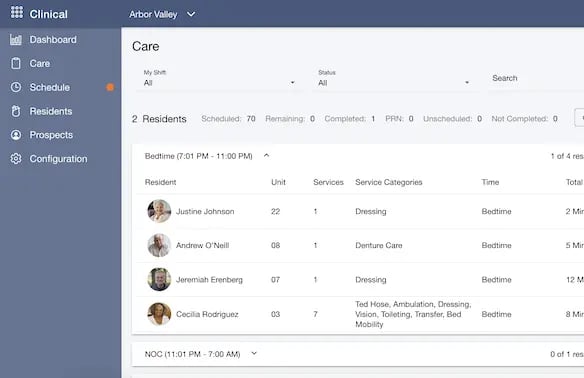The 3 Types of EHR Systems to Choose From

Faxes, handwritten prescriptions, and paper charts have become obsolete in many healthcare organizations. In their place, senior living communities have increasingly embraced electronic health records (EHRs). These digital files include health information for residents like allergies, diagnoses, medical history, and test results.
It’s easy to see the appeal of EHRs. Care providers and senior living professionals can generate, update, and send resident records in real-time across secure networks. Senior living communities can choose from several types of EHR systems, including cloud-based, physician-hosted, and remotely-hosted EHRs.
If you’re in the market for EHR software, you may wonder which system will fit your senior living organization’s needs. This handy guide reviews the three main types of EHR solutions, and examines their advantages and disadvantages.
Cloud-Based EHR
If you use Google Drive or Dropbox, you’re already familiar with cloud storage. This term refers to software applications that store and transmit data on dedicated off-site servers, known as “the cloud.”
Cloud-based EHR like Eldermark’s EHR solution differs somewhat from mainstream applications. These tools must comply with HIPAA regulations to keep electronic medical records confidential and secure. As a result, cloud-based EHR has extra layers of protection to ensure that only authorized healthcare professionals can access resident data. Get in touch for a free demonstration of our EHR software.
Pros and Cons of Cloud-Based EHR Software
Like all health information technology, cloud-based EHR has several benefits and drawbacks.
|
Pros of Cloud-Based EHR Software |
Cons of Cloud-Based EHR Software |
|
Accessibility: Authorized care providers can access resident information from any location and using any approved device. This feature provides greater flexibility because staff members don’t need to rely on on-site computers. |
Internet Reliance: You must be connected to the Internet to access and update EHR data. This limitation may make this type of system unreliable for organizations with unreliable internet access. |
|
Affordability: Many cloud-based EHR systems have low price points, so small practices and senior living communities with limited budgets can afford them. Plus, you won’t need to hire IT professionals to maintain the software. |
Ongoing Expenses: Typically, cloud-based services charge monthly usage fees. |
|
Increase Efficiency: Cloud storage allows senior living professionals to quickly share resident medical information with pharmacies, primary care clinics, and other healthcare organizations. |
Slow Upload Times: Occasionally, you may experience upload delays for huge files. |
|
SaaS Features: Many cloud-based EHR solutions have additional Software as a Service (SAAS) features to streamline workflows. For instance, an EHR platform could have an integrated appointment scheduler and payment portal. |
Limited Customization: You might have fewer options to customize your EHR software to suit your organization’s unique needs, though some solutions are more flexible than others. |
|
Secure Storage: If a disaster strikes your senior living community, you can rest easy knowing that your residents’ valuable data is securely stored off-site. |
Security Risks: While cloud-based EHR is generally safe, every company must work to meet digital security requirements to ensure that their databases are secure. |
Integration Capabilities With a Cloud-Based EHR
One of the main benefits of this type of electronic health record system is the ability to integrate with all the other care coordination systems your organization uses. A cloud-based EHR can streamline workflows by connecting with CRM, EMAR, mobile POC software, and more.
With Eldermark, your senior living community gets access to Eldermark NEXT, our modern, end-to-end software platform designed specifically for senior living needs. Instead of partnering with different providers for all your software needs, Eldermark NEXT brings it all under one platform, skyrocketing your team’s efficiency.
Physician-Hosted EHR
Despite the name, physician-hosted EHR isn’t limited to physicians. Under this traditional approach, all medical information gets stored in on-site servers owned by individual healthcare providers, senior living communities, or organizations.
Pros and Cons of Physician-Hosted EHR Software
Let’s break down the advantages and disadvantages of a physician-hosted system.
|
Pros of Physician-Hosted EHR Software |
Cons of Physician-Hosted EHR Software |
|
Infrequent Expenses: You’ll need to spend a significant amount of money upfront to buy servers and other equipment. However, you won’t have to pay monthly data storage fees to external EHR vendors. |
Cost: This system can be expensive because providers must purchase the technology and hire staff to maintain it. For this reason, physician-hosted software is mostly used by large healthcare organizations with big budgets. |
|
Greater Speed: On-premise servers can upload and share information marginally faster than remote servers. |
Downtime: The organization must periodically shut down the computer system for short periods to install updates, which can be inconvenient for staff. |
|
Increased Flexibility: You can choose the optimal combination of hardware and software to maximize functionality and interoperability. |
Ongoing Maintenance: Health IT staff must actively monitor and maintain the system to keep residents’ data safe. |
|
Retain Data Ownership: The organization owns its medical data without interference from outside entities. |
Possible Data Loss: If the organization shuts down, residents might be unable to access and transfer their medical data. |
Remotely-Hosted EHR
Remotely-hosted systems store data on third-party servers owned by EHR vendors. These solutions often use cloud-based storage, as discussed above. Other models include dedicated servers reserved for specific organizations and subsidized servers funded by the vendor.
Pros and Cons of Remotely-Hosted EHR Software
Here are a few factors to consider when researching remotely-hosted EHR systems.
|
Pros of Remotely-Hosted EHR Software |
Cons of Remotely-Hosted EHR Software |
|
Fast Start-up: You can quickly start using remotely-hosted EHR without installing complicated hardware and software. |
Internet Reliance: Because data is stored off-site, you need to use the Internet to access it. |
|
Cost Savings: This system is less expensive than physician-hosted EHR software, so it’s more affordable for small organizations. |
Loss of Data Ownership: Organizations that use subsidized servers must surrender ownership of their medical data. This loss of control can lead to sticky legal situations. |
|
No Maintenance Responsibilities: The server owner handles all updates and security issues, saving healthcare organizations time and money. |
No Control Over Maintenance Schedule: The external vendor updates the server on their own schedule, which may result in inconvenient downtimes. |
Which Type of EHR System Is Right for Me?
Assisted living professionals have plenty of options when shopping for EHR systems. But how can you find the best senior living software for your organization? Look for an EHR solution with these convenient features:
- 24/7 customer support services
- Automated features, like automatic medical billing for documented services
- Cloud-based storage for off-site accessibility
- Easy setup
- Flags for drug interactions and other medical errors
- HIPAA-compliant storage
- Integration with other senior living healthcare solutions, such as CRM, EMAR, and mobile Point of Care software
- Templates to reduce the time spent on documentation
- Training resources, including vendor-taught classes, modules, and videos
- User-friendly dashboard
Eldermark’s cloud-based EHR offers the perfect combination of accessibility, affordability, and security. Our expert developers created this software specifically for senior living communities, so every feature is designed to meet the needs of industry professionals. You’ll never have to worry about the safety of your residents’ data or stress about server maintenance.
*THIS POST UPDATED FEBRUARY 2024*
Get in touch today to schedule a free demonstration of our EHR software. And check out our customer testimonials to learn why the top senior living communities choose Eldermark solutions.
FAQs About the Types of EHR Systems
Each type of EHR system offers its own benefits, but they also come with their own challenges and risks. Here’s a closer look at the challenges associated with EHRs:
Cloud-Based EHR
- Internet Dependency: Cloud-based EHRs require a reliable internet connection. In areas with poor connectivity, this can lead to issues.
- Data Security Concerns: While cloud providers implement robust security measures, the external management of data can raise concerns for some about privacy and security.
Physician-Hosted EHR Challenges
- High Initial Costs: The upfront investment for on-site servers, infrastructure, and software licensing can be significant.
- Maintenance and Updates: Physician-hosted systems require ongoing maintenance and updates, necessitating the cost of a dedicated IT staff.
- Physical Space Requirements: Housing servers on-site requires physical space and a secure environment.
Remotely-Hosted EHR Challenges
- Data Control and Ownership: With data hosted on third-party servers, some organizations may have concerns over data ownership and control.
- Vendor Dependence: Reliance on a vendor for maintenance and support can potentially lead to longer downtimes and slower updates.
- Performance and Speed: Depending on the vendor's infrastructure, remotely-hosted EHRs can experience slower access times compared to local solutions.
EHRs and Electronic Medical Records (EMRs) are both digital records of resident health information, but they serve different purposes. An EMR is a digital version of a resident’s medical records. It contains the resident’s medical and treatment history within that senior community. EHRs, on the other hand, offer a broader view of a resident's health history, treatments, and outcomes. They are designed to be shared and accessed by authorized providers across different healthcare settings.
Though there is no data on which type is most common across the U.S., cloud-based EHR systems are becoming more and more popular among healthcare facilities and senior living communities because of several key factors:
- Cost effectiveness
- Scalability
- Ease of access
- Compliance and security




